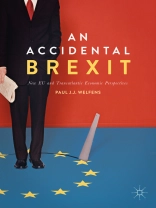This book analyzes how the EU referendum in the United Kingdom came to pass and what the foreseeable consequences are for the UK, Europe, US and world economy. The Brexit decision represents a momentous event for Europe, which weakens the EU and shifts the global balance of power. Welfens argues the EU has lost its appeal and is not in keeping with the twenty-first century, which is being shaped by Asia and digital innovations. The subject of immigration from EU countries played a key role in the Brexit decision, with an anti-EU campaign that was profoundly biased. The estimated impact of the referendum was deeply distorted by the broadly inadequate information produced by the Cameron government, which omitted the expected 10 percent loss in income caused by leaving the EU. With this this information, there could have been a clear pro-EU majority. In the absence of a second referendum, one cannot know what the British electorate really wants. Both the Brexit decision and new Presidentof the United States Donald Trump’s approach to European disintegration dynamics also raise serious questions about the future of transatlantic relations.
Inhaltsverzeichnis
Chapter 1. Introduction.- Part I. The Referendum Process and Poltico-Economic Aspects.- Chapter 2. Brexit: A Campaign and a Fatal Communication Disaster.- Chapter 3. A Sequencing of the Economic Effects of Brexit.- Part II. UK, US and EU Perspectives.- Chapter 4. Aspects of British History and Policy.- Chapter 5. Key Issues for the New British Government.- Chapter 6. Medium-term UK Macroeconomic Perspectives.- Chapter 7. Brexit from a US Point of View.- Chapter 8. Trump Policies Expected to Contradict 70 Years of American Principles and Rationale.- Chapter 9. Can Brexit be an Economic Success and What Effects can be Expected for the EU27?.- Part III. EU Developments.- Chapter 10. What is the EU? A Redistribution and Trade Engine with a Political Element.- Chapter 11. The History of European Integration and the Role of Rules.- Chapter 12. EU Integration Perspectives after Brexit.- Chapter 13. Eurozone Perspectives and Reform Needs.- Part IV. Consequences.- Chapter 14. A Second Brexit Referendum: A Scenario for Staying in the EU.- Chapter 15. Beyond Brexit: Inequality Dynamics and A European Social Market Economy.- Chapter 16. Conclusions.
Über den Autor
Paul J.J. Welfens is Jean Monnet Professor for European Economic Integration, Chair for Macroeconomics at the Schumpeter School of Business and Economics, and President of the European Institute for International Economic Relations at the University of Wuppertal, Germany. He is Research Fellow at IZA, Germany, and Non-Resident Senior Research Fellow at AICGS/Johns Hopkins University, USA.












